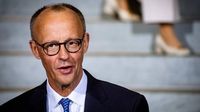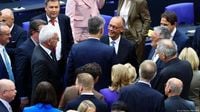In a surprising turn of events, Friedrich Merz was elected as the tenth Chancellor of Germany on May 6, 2025, after initially failing to secure the position in the first ballot. The 69-year-old received 325 votes in favor during the second ballot, with 289 votes against, one abstention, and three invalid votes. This election marks a significant moment in German politics, as it is the first time a designated Chancellor has failed to win in the initial round following successful coalition negotiations.
Merz's journey to the chancellorship began with an unexpected setback in the first round, where he garnered only 310 votes in favor, against 307 votes opposing him, along with three abstentions and one invalid vote. The new coalition formed by the CDU/CSU and SPD holds 328 seats in the Bundestag, indicating that at least 18 votes from the coalition were missing during the first vote.
Following his appointment by President Frank-Walter Steinmeier, Merz took his oath of office in the Bundestag. In a traditional gesture, he included the religious phrase "so wahr mir Gott helfe" in his oath, despite it not being a constitutional requirement. Bundestag President Julia Klöckner (CDU) expressed her delight at the cheerful atmosphere in the house during the session's opening, welcoming guests including former Chancellor Angela Merkel.
After the initial voting, the mood shifted dramatically. The session was interrupted as party leaders retreated for discussions on the next steps. A consensus was reached among the CDU/CSU, SPD, Greens, and Left parties to hold a second vote later that same day. CDU Secretary General Carsten Linnemann reported that Merz was met with "frenetic applause" internally after the first vote, indicating strong party support despite the earlier setback.
CSU leader Markus Söder warned of the potential consequences of the failed first vote, likening the situation to a "prelude to Weimar," a reference to the instability that preceded the rise of the Nazi regime in Germany. He urged all democrats to work towards establishing a stable government, emphasizing that now is not the time for vendettas or score-settling.
In contrast, SPD parliamentary group leader Lars Klingbeil stated he had "not the slightest indication" that the SPD had not fully supported Merz. He highlighted the party's commitment to the coalition agreement as a mandate from its members. However, reactions to the voting results were mixed within the SPD. Mecklenburg-Vorpommern's Prime Minister Manuela Schwesig expressed her disbelief at the outcome, calling it "irresponsible" but refrained from speculating on which factions may have withheld their support.
Opposition leaders were quick to criticize Merz's election. AfD party leader Tino Chrupalla described the initial defeat as a "disastrous start" to Merz's chancellorship, while co-chair Alice Weidel suggested that the best course of action would be for Merz to resign and call for new elections. Green Party leader Britta Haßelmann expressed concerns over the lack of a clear majority, suggesting that this could bode poorly for the new coalition's governance.
Despite the challenges, Merz's government aims to move forward. On May 7, 2025, he began his first foreign trip, meeting with French President Emmanuel Macron in Paris. During this visit, Merz emphasized the need for a swift ratification of the Mercosur free trade agreement, which aims to facilitate European exports to South America. He acknowledged existing concerns from France regarding agricultural issues but expressed optimism about finding common ground.
In addition to strengthening ties with France, Merz announced plans to visit Ukraine in the coming weeks, aiming to contribute to a lasting ceasefire and peace agreement with Russia. He also highlighted the importance of continued U.S. involvement in these discussions, indicating a desire for a united approach to European security.
Interior Minister Alexander Dobrindt (CSU) revealed plans to deploy an additional 3,000 federal police officers to Germany's borders, increasing the total number of border protection officers to 14,000. This move aims to enhance the prevention of unauthorized entries into Germany, reflecting the new government's focus on security.
As the new ministers settle into their roles, the SPD has appointed Matthias Miersch as the new parliamentary group leader, succeeding Lars Klingbeil, who has taken on the role of Finance Minister. Miersch's election was met with a strong mandate, receiving 83.2 percent of the votes.
Despite the turbulence surrounding Merz's election, former SPD Chairman Kurt Beck expressed confidence that the black-red coalition would demonstrate unity as they tackle the pressing issues facing Germany. He noted that the political landscape often reveals itself through open discourse rather than secret ballots.
Meanwhile, the Left Party has called for greater collaboration with the Union on political decisions, while CDU parliamentary group leader Steffen Bilger has reiterated the party's stance on maintaining its incompatibility resolution with the Left Party.
As the dust settles from the election, the new government faces the daunting task of restoring public trust and delivering on their promises. With a coalition that includes both the CDU/CSU and SPD, the focus will be on addressing economic challenges and establishing a coherent strategy for the future.
Looking ahead, the first regular Bundestag session with the new ministers is scheduled for May 14, 2025. The government is keen to present a united front and begin the legislative process, although it may take weeks before any significant laws are passed.
In a climate of uncertainty, the new Chancellor and his coalition partners are determined to navigate the complexities of German politics and fulfill their commitment to the electorate. As they embark on this journey, the eyes of the nation remain fixed on how they will manage the challenges ahead.





